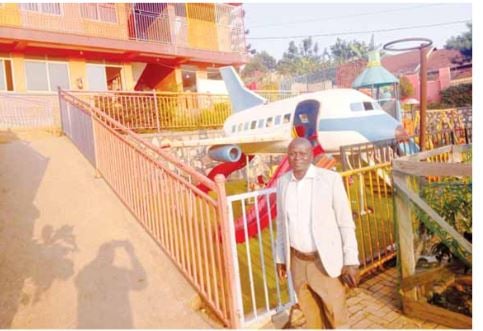
Ms Robinah Nakagolo says learners who participate in co-curricular activities gain self-confidence which helps to boost self-esteem and self-worth. PHOTO | OWEN WAGABAZA
Recently, Aggrey Memorial School, Bunamwaya organized its annual inter-house Music, Dance, and Drama competitions. The students grouped in houses competed in poems, folk songs, traditional dance, and contemporary dance among others.
The well-attended event was graced by among others parents and several guests. Mr Stanley Mugume, the headteacher of Kyambogo College School, who was among the guests says he was shocked when he received an invitation for this year’s MDD event.
“The headteacher must be so passionate about MDD, especially going by the fact that she is running a Universal Secondary School. Most USE schools and private schools alone tend to dodge such activities because it is quite expensive to organise them,” Mugume says.
However, Ms Robinah Nakagolo, the Headteacher of Aggrey Memorial School says she has been organizing MDD events since 2019 when she was posted to the school.
“I came in 2019 when the school had last had such competitions decades ago and I immediately embarked on a plan to revive them,” says Nakagolo.
“The school had only 200 students, dilapidated infrastructure and performing poorly academically, and it is activities like these that have enabled us to revive the it to where it is now,” says Nakagolo.
Aggrey Memorial currently has an enrollment of over 800 students and registered 23 First grades in the 2023 UCE UNEB results.
According to Nakagolo, every school, in whatever state it is in, should endeavor to provide a platform for the students to engage in co-curricular activities because of the many benefits that come with it. “Less than that, you are doing a disservice to the country,” she says.
A Necessity
According to Nakagolo, Co-curricular activities are not only fun-filled and entertaining, but a necessity.
“They help teach important life skills, laying the foundation for children and teens to mature into responsible well-balanced adults,” she says.
Nakagolo says, learners who participate in co-curricular activities gain self-confidence which helps to boost self-esteem and self-worth. According to Nakagolo, students can appreciate diversity, form new friendships, learn skills of negotiation and conflict resolution and learn to become team players working towards common goals.
“These skills combined help them to learn to interact appropriately with others, a skill which is needed in every aspect of life.”
Mr Stanley Mugume, the headteacher of Kyambogo College School says participation in co-curricular activities helps children to avoid engaging in troublesome behaviour such as substance abuse, and early sexual activity as their time is occupied by engaging in more socially constructive activities.
They also encourage time management and a sense of commitment.
According to Mugume, being part of a co-curricular activity requires commitment and dedication.
“Students learn that regular practice, rehearsals, or meetings are necessary to improve their skills or contribute meaningfully to the group. This sense of commitment instills responsibility and discipline in students, teaching them the value of perseverance and hard work,” says Mugume.
He adds that time is heavily emphasized which is particularly important as it enables children and teens to multitask and micromanage as they juggle the demands of school.
“Given the fast-paced world that we now live in, this is an important skill that students need to learn to adapt to their environment,” Mugume says.
Joseph Sserubiri, an education consultant says co-curricular should be encouraged as they promote physical development.
“Children who participate in physically demanding activities such as swimming, track and field, football, dance, cricket and netball get the opportunity to exercise, develop their muscles, and maintain good cardiovascular health. Children with disabilities also stand to develop hand-eye co-ordination, mobility, and grasping ability among other things,” Sserubiri says.
Fagil Mandy, a retired educationist says that co-curricular improve cognitive development. “By participating in extra/co-curricular activities, reasoning ability, problem solving and decision making skills are continuously being developed. Participation in extracurricular activities can help to reinforce and expand on what was learned during school hours,” says Mandy.
According to Mandy, research indicates that on average, students who participate in these activities perform better academically than their non-participating peers and are more likely to go further in their education.
Many schools in Uganda are shunning co-curricular activities due to limited financial resources to fund co-curricular activities.
According to Sserubiri, schools lack adequate equipment, facilities, infrastructure, and trained staff in the different specialised co-curricular activities. “There is also negative attitudes among some students and staff towards co-curricular activities,” says Sserubiri.
Nevertheless, Sserubiri calls upon schools to always endeavor to provide a platform for a diverse range of co-curricular activities, and parents to encourage their children to participate in these activities. “Before you enroll a child in a school, try to inquire about their co-curricular timetable and calendar,” Sserubiri advises.


